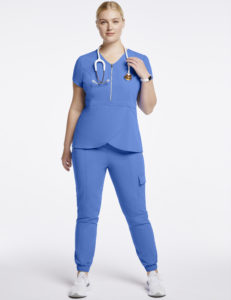If you’re looking at jobs in nursing, you probably have a lot of questions. We get that. There are many different paths you can take in this field, and then there are laundry lists of specializations, educational requirements and certifications.
So, how can you parse all the different types of nursing career options? Stick with us. In this article, we’ll break down all of the main types of nursing, look at different specialties and explain the right educational routes to achieving your dreams in this field.
To bring you up to speed on the registered nursing career path, we’ll give you a rundown of what you’d do in this role and explain how to get certified to perform this work. Plus, we’ll delve into the registered nursing specialties (so that you don’t have to spend the rest of the day Googling this information).
We want you to find a career you love. We certainly love ours, which has everything to do with supporting you and other medical professionals, so we’re more than happy to take some of the work out of your research and give you the tools to make informed decisions.
What is a registered nurse?

A registered nurse is a licensed healthcare provider who has passed the NCLEX-RN exam. RNs work directly with patients, specialize in different areas and work in varied environments:
- Hospitals
- Homes
- Physicians’ offices
- Nursing homes
- Schools
- Prisons
- Community centers
- Public health offices
- Other healthcare facilities
What do registered nurses do?

Registered nurses manage and provide patient care. They also educate patients on common health conditions.
What’s the difference between an RN and an LPN?
When it comes time to select a nursing career, you’ll inevitably have to learn plenty of acronyms and what they mean. What’s the difference between registered nurses (RNs) and licensed practical nurses (LPNs), for example? Let’s break it down: RNs can work directly with patients and LPNs assist nurses and doctors. As you may have imagined, registered nurses are, therefore, required to have more schooling than LPNs, who have relatively fewer responsibilities.
What’s the difference between an RN and an NP?
Another acronym? That’s right. A nurse practitioner (NP) takes on more responsibility than an RN and has the power to diagnose patients, send for testing and prescribe treatments. That is, NPs can do some of the work that doctors normally do, thanks to NPs’ high level of education and training.
What’s the difference between an RN and a nursing assistant?

A nursing assistant or a certified nursing assistant (CNA) works directly with patients but not as independently as an RN does. CNAs don’t necessarily need a college degree to practice, as there are vocational programs in this field that one can receive after graduating from high school. Because the CNA role requires fewer years of study, their job responsibilities are fewer. But, the positive impact of a CNA is still great.
What duties does an RN have?
Of course, an RN’s responsibilities will vary by specialization and working environment, but here are some of the most common registered nurse duties:
- Assessing patients
- Making patient observations
- Noting patients’ symptoms and health history
- Creating patient care plans
- Changing wound dressings
- Working in a team of medical professionals
- Administering medications
- Providing treatments
- Drawing blood
- Taking lab samples
- Educating patients and their families
What types of jobs can you get as an RN?

RNs can specialize in a number of ways, so this is in no way a one-size-fits-all nursing job. It’s one that you can tailor to your interests. And, as expert tailors ourselves, we think that’s everything in a career.
- Pediatric care nurse: Perform medical-surgical or critical care nurse tasks on children.
- Operating room nurse: Educate patients, get patients ready for surgery, put in IVs, perform pain management, sanitize rooms and tools.
- Critical care nurse: Administer medication, perform pain management, dress wounds, monitor patients and plan patient care.
- Charge nurse: Manage patient care and urgent situations, plan and provide education, admit and discharge.
- Nurse case manager: Plan caseloads, care and discharges, and filter admissions.
- Medical-surgical nurse: Plan care, give medication, take vital signs, provide pain management, dress wounds and maintain charts.
- Quality review nurse (also known as a utilization review nurse): Work with patients to understand and record information on the quality of their care and follow up on patient care plans.
- Public health nurse: Provide public health education and initiatives, and perform screenings.
Are registered nurses in demand?

Good news. There are plenty of RN jobs out there, and every year there will be even more. According to the Bureau of Labor Statistics, registered nursing opportunities will increase by 9% by 2030, which translates into 94,500 job openings for registered nurses annually.
We know you want to know if the money is good. There’s no shame in asking. And hey, we’re not shy about sharing. You deserve to earn well for the hard work you do. The salary for a nurse of this type was estimated at roughly $75,330 annually for 2020.
What are the requirements to become a registered nurse?
To become a registered nurse, you’ll first need to get a college-level degree from a nursing program. One route is to get your Associate of Science in Nursing (ASN). Alternatively, you can get your Bachelor of Science in Nursing (BSN), which may be the right move if you think you may want to later get a Master’s or Doctorate, or practice a more advanced type of nursing. One thing’s for sure: whatever career path you decide, you’ll need to pass the NCLEX-RN exam.
As you take on your nursing career by furthering your education and studying for big exams, we’ll have your back with the most luxuriously comfortable scrubs (and tons of moral support). Remember, we’re here to help you look great. After all, if you look great, you’re more likely to feel great. And if you feel great, you’re all the more likely to succeed, no matter what you set your mind and heart to!

